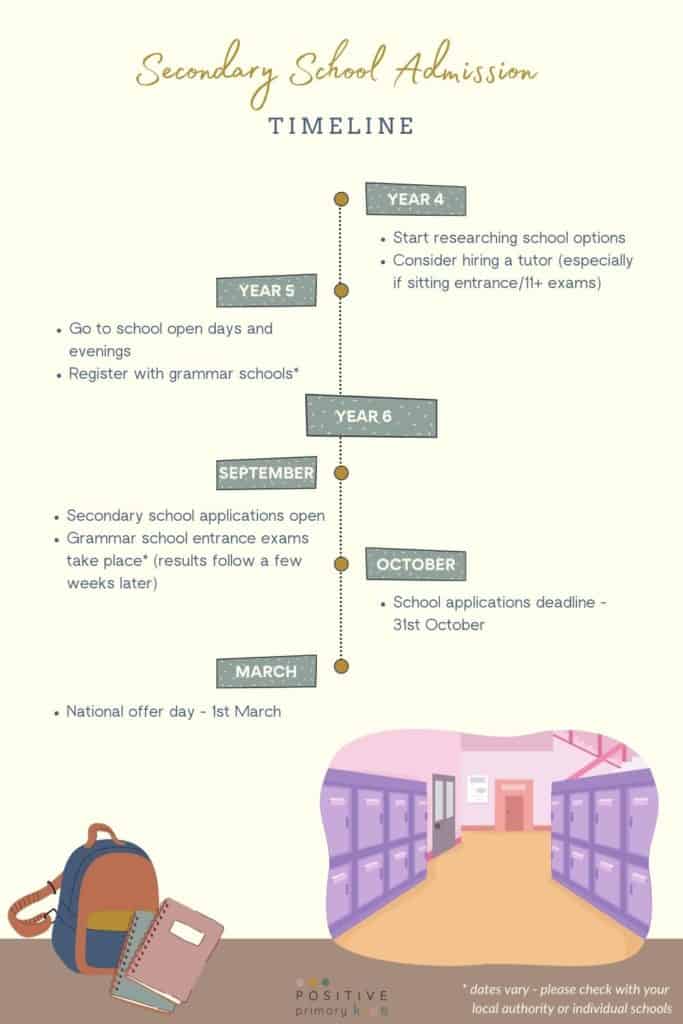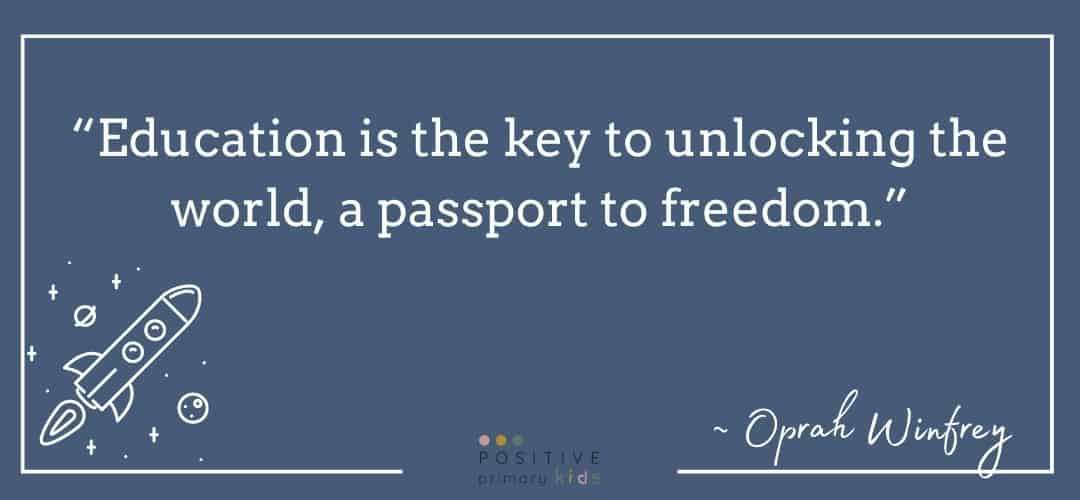As your child approaches the final years of primary, it’s time to start thinking about how to choose the right secondary school for them.
There’s a lot to consider and it can be overwhelming and stressful. This is why a lot of parents start researching early. There’s a lot to
figure out: How will they get there? Has it got a good reputation? Are faith schools important to you? Grammar, comprehensive, private…?
This post will help you to identify which considerations are important to you so that you can choose the right secondary school for your child with confidence.
Affiliate Disclosure: This post may contain affiliate links. This means that I may receive a small commision – at no cost to you – if you make a purchase through these links. Thank you for your support!
When to Start Thinking About Secondary Schools
Important: The exact process of applying for secondary schools varies around the UK, but important dates and deadlines tend to be around the same time. Please make sure to check with your local council for clarity.
Applications don’t open until your child reaches year 6. But don’t leave your research and decision making until the last minute. Many good schools are oversubscribed and you want to be aware of any schools that would be a bad fit for your child.
Year 4
Start to look into the options available to you in your area when your child is around 8 years old. You don’t need to do too much yet. Get a feel for schools by visiting websites and looking at brochures. Ask people who have experience with them for feedback. At this stage, you can start a list of the schools that you prefer – and those that you want to avoid!
Are you considering a selective school that accepts children based on academic ability? If so, you may want to start preparing early or looking for a tutor to get them ready for entrance exams. I offer entrance exams tuition, so if you’d like to find out more, pop over to my services page.
Year 5
You will be able to visit secondary school open days or open evenings during year 5. You can ask questions and learn about the ethos of the school. Open days are great because you can see the school ‘in action’. Try and peak around and have a look where they don’t show you on a tour if you can! That way you can see what it’s like in the areas that they haven’t prepared.
Grammar school applications open between April and July in most areas. Make sure you check the exact dates and process with your chosen school or local council.
Year 6
Most councils open applications for secondary places in September. The deadline for applying is usually 31st October.
If your child is sitting 11+ entrance exams for grammar school, they are usually held in September of year 6. Some grammars hold the exams at their school site, whilst others may hold them at the children’s current school or a testing centre.

How to Choose The Right Type of School For your Child?
Here’s a brief explanation of the different types:
State Schools or Private Schools?
Secondary schools in the UK can be broadly classified as either in the state sector or the private sector.
State schools are government-funded and follow the national curriculum. Schools in the private sector (also known as independent schools) charge fees to attend and do not have to follow the national curriculum.
The vast majority of secondary school-aged children in the UK attend state schools.
Read on for the main differences between different types of schools within these two sectors.
Types of Secondary State Schools
As mentioned above, state schools are government-funded and free to attend. Most state schools are required to follow the national curriculum.
Many local authorities set ‘banding tests’ that are sat by children in year 5. These are used in an effort to ensure a fair spread of abilities across state secondary schools.
Here are the most common types of state school:
- Comprehensive schools, also known as community schools and maintained schools, are owned, controlled and funded by the local authority. Currently, the majority of secondary schools are community schools.
- Foundation schools and trust schools are funded by the local authority but controlled by the governing body who can set admission criteria. They are usually owned by a charity or the governing body.
- Voluntary aided schools are usually religious schools, also known as faith schools. They are funded partly by the local authority and partly by the religious organisation. The governing body contributes to premises costs and decides on admission criteria, which are likely to be quite specific.
- Voluntary controlled schools are similar to voluntary aided schools except that all funding comes from the local authority.
- Grammar schools are selective schools that are funded by the local authority but controlled by the governing body. Children wishing to enter grammar school sit the 11+ exam. Each grammar school has a set standard that must be reached in the exams before they are offered a place. Entry to many grammar schools is fiercely competitive.
- Academies are state schools that are government-funded rather than receiving funds from the local authority. They have more freedom over their curriculum than other state schools as long as it is broad and balanced. Academies often have different term dates to other local schools.
- Free schools are a type of academy in that they are funded by the government directly. They can be set up by a wide range of groups from parents to community groups.
- Specialist schools are can be community schools or academies and although they follow the national curriculum, they offer a focus on a specific subject, such as the arts, technology, sports or maths.
- City technology colleges teach the national curriculum but they also offer vocational subjects and qualifications to develop practical and technical skills.
- Special Educational Needs (SEN) schools are attended by children who are not able to attend mainstream schools because they have specific learning needs. They often specialise in teaching children with specific needs, such as autism or visual impairment. Note: Many SEN schools are independent schools that aren’t funded by the local authority.
Private and Independent Secondary Schools
These are fee-paying schools that are self-governed and are not funded by the government. Fees can be incredibly high, although many do offer scholarships to attract particularly talented pupils who would normally not be able to afford to attend.
They can set their own curriculum and can often offer exceptional facilities and opportunities.
Independent schools have their own selection criteria. Some welcome pupils of all abilities. Most select high achievers through competitive exams, which are often written by themselves.
Public schools
Public schools, confusingly, are far from ‘public’. These are the most academic and highly exclusive schools. Think well-established schools such as Eton College, Harrow and Rugby Schools. Traditionally boys’ boarding schools, there are now many which have day pupils and accept boys and girls.
What Matters to You?
Every child is different, with their own talents, strengths, weaknesses and goals. So what matters to you may be completely different to another family.
Here are some questions that you can ask to help you focus on what really matters to you.
- Are you in the school’s catchment area?
- How far away is the school?
- Will your child get there by public transport? If so what is the route?
- Do you want to keep your child with their group of friends?
- What is the average class size?
- What are the entry requirements?
- Is there a uniform?
- What facilities does the school have?
- Is the school well maintained?
- What is the school’s local reputation?
- Does the school educate the whole child (emotional literacy, health, wellbeing)?
- Is it a single or mixed-sex school?
- Is a religious education important to you?
- Which GCSE or A-Level subjects are offered?
- What are their GCSE or A-Level results?
- Is there a before or after school club?
- What are the school’s homework expectations?
- If your child has specific needs, how will they be supported?
- Are all children making progress, or is all the attention focussed on the most/least academic pupils?
- Will your child cope with the school’s size/curriculum/expectations?
- What extra-curricular opportunities are there?
- How is discipline approached?
- Do they have a high turnover of staff or governors? This can be a warning sign!
- If you attend an open day, how do the pupils interact with you? Are they polite?
Final Reminders and Tips about Choosing the Right Secondary School
- Decide which type(s) of school are a good fit
- Do some research online, order brochures and talk to people who know the school
- Visit schools when your child is in year 5 for open days and evenings
- Spend time thinking about the questions to ask about the things that matter to you
- Make sure that you have all the relevant application dates and deadlines in your calendar
I’ll end with a few final tips:
Please bear in mind that schools can change a lot in a short period of time, so don’t rely overly on Ofsted reports – in my opinion, they can be next to useless! League tables are more useful because you can look at how different groups of children perform at the school.
Word of mouth is a powerful thing! What do other parents have to say about different schools? Get involved in the playground chatter to hear various opinions. Learning from people who are connected to the school is always going to be better than relying on glossy brochures and websites that are designed to impress and present only the positive aspects of a school.
What are the most important things to you when it comes to choosing the right school?
Are you currently looking for the best school for your child?
Have you recently been through the process?
Share your questions, experiences and tips in the comments below and help out other readers!
- Secondary school applications: What parents and prospective pupils need to know before deadline day – The Education Hub
- The parents’ guide to secondary school: types of school – The School Run
- Compare School Performance – Gov.uk







0 Comments